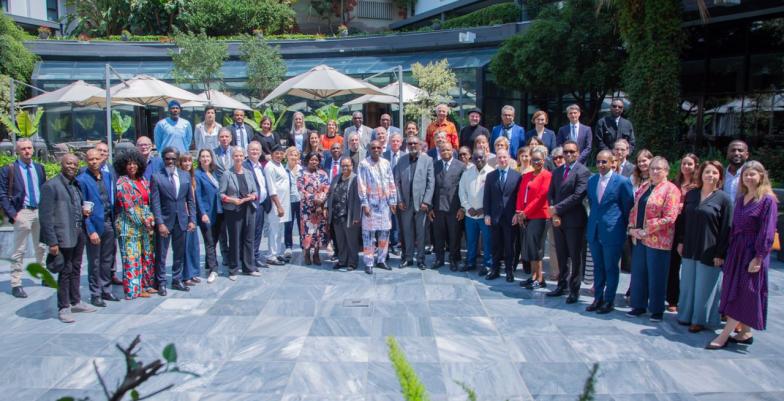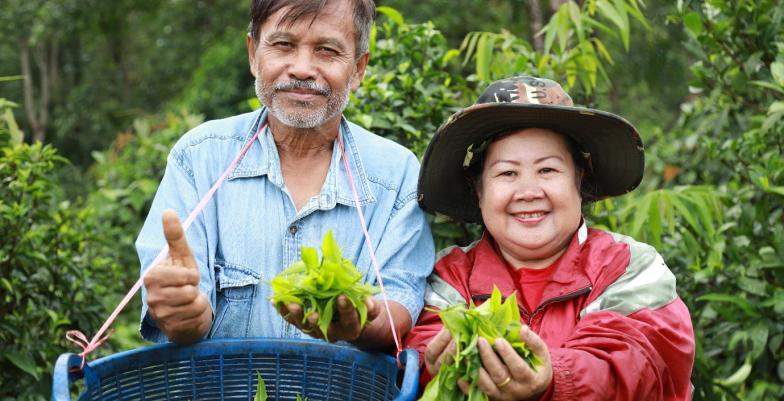RELATIONS WITH THE EU
The European Union and the African Union - Human Development
Under the Strategic priority area – education, science, technology and skills development - the AU and EU work to achieve the key objectives of increasing access to knowledge and skills; improving the quality of education and training programmes, with a better linking of education and skills to employment; and unlock the potential offered by research, technology, innovation and the digital economy.
The COVID-19 pandemic has transformed health into a global, European and African priority. As the crisis continues to affect all aspects of sustainable development, Europe and Africa have much to share in efforts to deliver healthcare through mechanisms that are based on solidarity and inclusivity, quality and efficiency.
On This Page
Education
The Initiatives under the AU-EU Partnership on Education have a strong focus on supporting continental approaches that feed to the regional integration process in Africa; notably through harmonization of education systems and quality assurance, mutual recognition of qualifications, sharing of best practices, facilitating mobility and exchanges.
There are a number of initiatives contributing to this partnership namely the Africa Continental Qualification Framework Project, the Harmonization of African Higher Education Quality Assurance and Accreditation project, the Intra-Africa Academic Mobility Scheme, the AU-EU Skills for Youth Employability Programme, African Students and Alumni Forum.
Health and Covid
The overall goal of the health priority area is to contribute to stronger health systems and universal health coverage, with greater coherence across African regions, thereby substantiating the EU-Africa partnership in health, and also reinforcing the pillars of the new European Health Union.
Under the new MFF, the partnership will focus on four main areas of intervention: Enhancing health security and pandemic preparedness and response in Africa; Strengthening African pharmaceutical systems and regional manufacturing capacity for vaccines and other medical products and technologies; Supporting Africa-based public health institutional capacity; and Enable the legal, political and societal environment for Sexual and Reproductive Health Rights in Africa.
The EU has shown its firm commitment to assist its partner countries in Africa and particularly Africa CDC in their efforts to meet the urgent health and humanitarian needs caused by COVID-19 as well as address its long-term socio-economic consequences.
The Team Europe approach has enabled rapid delivery of support to Africa CDC, and has been an effective platform to coordinate the support from EU and the Member state. So far the Team Europe (EU, Germany, Austria, Spain, and Sweden) have collectively mobilized 26.7 million Euro direct support to Africa CDC. This support is contributing to the implementation of the Africa Joint Continental Strategy for COVID-19 Pandemic by enabling Africa CDC to deploy rapid responders and community health workers, provision of in-country and virtual training, risk communication and community engagement, coordination of the continental task force, and enhancing preventive measures and surveillance capacities in IDP and refugee camps.
Research and Innovation
Horizon Europe, the EU’s key funding programme for research and innovation with a budget of €95.5 billion, has been launched. The Horizon Europe work programme 2021-2022 includes the Africa Initiative with around 40 topics with a budget of around €350 million under Calls for Proposals that are particularly relevant for cooperation with Africa.
As a strategic partner, the EU seeks to enhance cooperation with Africa to promote actions targeted to finding locally adapted solutions to challenges that are global in nature, but which often hit Africa hardest.
Effective to the understanding of the prominence of research and innovation for the collective growth of the continents of Africa and Europe, various programmes of cooperation have been developed to meet sustainable development goals; with joint efforts from the European Union and the African Union.
- The AU-EU High Level Policy Dialogue (HLPD) on Science, Technology and Innovation conducts regular exchanges on research and innovation policy, and decides on long-term priorities to strengthen cooperation. The HLPD was adopted at the 3rd AU-EU Summit in Tripoli in 2010 as an important element of the Joint Africa-EU Strategy (JAES).
- Advisory Groups have been established, with experts from Africa and Europe who will assist the European Commission on how to best boost the potential of research and innovation for Africa-Europe cooperation. Anticipated short-term results include an improved understanding of future demands of science, technology and innovation to the AU-EU Strategy and appropriate instruments to be used as well as an improved dialogue between AU and EU policymakers in the context of political priorities.
- The Union for the Mediterranean (UfM) regional platform on research and innovation was created in 1995 to monitor and promote cooperation in research, technology and development. It brings together the EU countries and all Mediterranean partner countries for a political dialogue to make recommendations for the joint implementation of research policy priorities.
Programmes and projects are directed towards the thematic priorities for research and innovation, as announced during the first ministerial meeting of the African Union and European Union research and innovation ministers in July 2020: Green transition, Innovation and technology, Public health & Capacities for science and higher education.
Another platform to join the community of researchers is EURAXESS Africa, which links researchers in Africa with Europe. Free information and events on European research and policies, career and funding opportunities, networking and collaboration possibilities.
Visit ENRICH IN AFRICA, the innovation platform that works with key partners and advisors from the innovation landscape of Europe and Africa to address the needs for capacity development of incubators, accelerators, and entrepreneurs in both regions.








